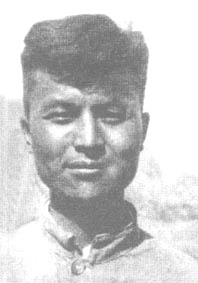Li Rui, a former personal secretary to Mao Zedong turned fierce critic of the authoritarian leader and his successors, died on Saturday in Beijing at age 101 from cancer-related organ failure. At The New York Times, reporting on Li’s death, Ian Johnson recalls his life as a trusted confidant to Mao; a purged Party member under remote re-education; a rehabilitated post-Mao Party bureaucrat; a sensitive historian; and finally a modern advocate for free expression, liberal values, and historical accuracy:
Blunt, brash and quick-witted, Mr. Li’s experience epitomized the hopes and disappointments of a generation. His perseverance and longevity made him one of the most influential government critics in the seven-decade history of the People’s Republic of China. His work also helped reshape historians’ understanding of key moments in modern Chinese history — especially Mao’s responsibility for the catastrophic Great Leap Forward, in which famine killed more than 35 million people — while his political connections allowed him to protect moderate critics and make open appeals for free speech and constitutional government.
But Mr. Li was no dissident. He died a Communist Party member, enjoying the privileges that came from having joined the party in 1937, earlier than almost anyone else alive in China. He had a large apartment, a generous pension and lavish benefits, such as top-flight medical care. The party imprisoned him, exiled him, and almost starved him to death, but even when it expelled him he eventually returned in hopes of effecting change from within.
“He saw himself as a conscience of the revolution and the party,” said Roderick MacFarquhar, a professor of Chinese history at Harvard University. “But he had grave doubts about the system he spent his life serving.” (Mr. MacFarquhar died on Sunday.) […] [Source]
Li’s funeral and state burial is reportedly scheduled this week at Babaoshan Revolutionary Cemetery, a site reserved for revolutionary heroes and high-ranking officials. At The Guardian, Lily Kuo reports that Li’s daughter Nanyang Li is boycotting the official service as it goes against her father’s stated wishes, and notes that censors appear to have taken effort to mute news of his death:
“I asked him [in 2008 and again last year at his 100th birthday] the exact same question: do you want to go to Babaoshan? Do you want a formal funeral and your body to be covered by the [Chinese Communist party] flag?’” she told the Guardian.
“He paused a long long time, thinking, then he very clearly said: ‘I should go back to my hometown and be buried near my parents because I left home so early and never took care of my mother.’”
[…] Nanyang, who lives in the US, said she would not be attending the funeral in protest.
[…] [Despite his veteran cadre status,] state media did not report his death widely. Articles and comments commemorating him appeared to have been censored.
Nanyang believes her father lost hope in the party when the Chinese leader, Xi Jinping, removed term limits last year, potentially allowing him to stay in power indefinitely. In one of his final interviews, given to Voice of America last year, he agreed with a turn of phrase circulating at the time: “Mao’s mistakes are not corrected and Xi accumulates his evil.” […] [Source]
Li Rui, former secretary to Chairman Mao and standard bearer of liberals within China’s Communist Party dies at 102. From San Francisco, his daughter Li Nanyang writes that she hopes China’s culture of following standard bearers will depart with him. pic.twitter.com/Eh07uK8RqE
— Anthony Kuhn (@akuhnNPRnews) February 16, 2019
Carefully phrased obituary for Li Rui in the Global Times. https://t.co/igF8zDpnby
— David Moser (@david__moser) February 17, 2019
Also on Twitter, Wilson Center fellow and China foreign policy scholar Joseph Torigian noted good news on the destination of Li’s personal files, and also highlighted the paradox of his politics:
Looks like Li Rui's personal files are going to the Hoover Archives. Absolutely great news. https://t.co/fU3MqbHVol
— Joseph Torigian (@JosephTorigian) February 16, 2019
Indeed, truly a man of contradictions. Li Rui was often critical of the party, but while giving a talk at UC Boulder he yelled at his daughter for comparing the CCP to Hitler’s Germany in front of Americans. https://t.co/RujqtBT4hr
— Joseph Torigian (@JosephTorigian) February 16, 2019
Li often spoke out for more inner party democracy, but he could also hold grudges and use backhanded maneuvers to undermine his opponents.
— Joseph Torigian (@JosephTorigian) February 16, 2019
For example, Li Rui once suggested to Hu Yaobang that HYB hang on to a particular document that could be used later on to blackmail Hu Qiaomu. HYB refused.
— Joseph Torigian (@JosephTorigian) February 16, 2019
In 1987, Li Rui damaged Deng Liqun's hopes for higher office by writing a letter that, among other things, included the fact that DLQ slept with Li Rui's wife in Yan'an – even though Deng had originally been assigned to investigate Li's wife.
— Joseph Torigian (@JosephTorigian) February 16, 2019
Although Li Rui's book on Lushan is a true classic, I've gotten the sense that some of his claims on elite politics in the 1980s were more problematic, including his claim that Xi Zhongxun loudly spoke out in favor of Hu Yaobang in early 1987.
— Joseph Torigian (@JosephTorigian) February 16, 2019
Read more about Li Rui, via CDT.








